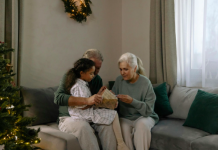There are few situations in life more challenging than the loss of a spouse, and many in this position will look to those close to them for support in such a situation. This includes seniors or those approaching this age range, who will often need support from their children and other loved ones after losing a spouse.
For those who live in assisted living communities or similar locations, there are also quality resources on-site for grief counseling and similar needs. However, these can only go so far in terms of truly soothing and comforting someone who has recently lost their husband or wife — if you’re the child or any other family member of someone in this position, here are some basic ways you can play a positive, impactful role in helping your loved one through this difficult time. These tips may also benefit you, as grief from your own position is completely normal in these situations as well.
Reminders that Grieving is Part of Healing
First and foremost, both for yourself and your loved one, it’s important to remember that grieving is a necessary part of the healing process. This doesn’t mean that life won’t ever be good again, but it can take time to get there. Don’t shy away from talking about the deceased spouse, and don’t try to rush your loved one through their grieving process; let them take things at their own pace.
Also keep in mind that periods of intense grief will be sporadic throughout the healing journey; don’t be surprised if your loved one is happy and seems to be doing well one day, and then experiences a major setback the next. This is all normal, so just be there for them as much as you can.
Being Kind to Oneself
Another quality recommendation here is to be kind to oneself. This means that, as the child or other relative of a grieving spouse, you should take care of yourself emotionally and mentally in order to provide the best support possible. This may include seeking out your own support system, whether that be friends or family members who will understand what you’re going through, or professional help if the situation becomes too difficult to manage on your own.
And naturally, you can pass these themes on to your grieving parent. Work with them on setting realistic expectations for themselves, and emphasizing that it’s okay to feel a variety of emotions — including sadness, anger, and frustration.
Talk About Your Lost Loved One — When Appropriate
For some, conversation about their departed spouse may actually be a positive part of the healing process. In these cases, being able to talk about cherished memories and positive aspects of the relationship can be comforting. Just be aware of your loved one’s comfort level with this type of discussion; if they’re not quite ready, don’t push it.
Look for Support Systems
In many cases, those who have recently experienced loss find it helpful to make connections with others who are also grieving. This can be done in a number of ways, including support groups or simply talking to others who have been through a similar experience.
If your loved one lives in an assisted living community or other location with supportive resources, be sure to take advantage of them. Grief counselors and similar staff members can often provide valuable insights and support during this difficult time.
Provide Practical Assistance
Finally, one of the most helpful things you can do as a relative is to provide practical assistance. This may include tasks such as taking care of errands, helping with household chores, or bringing over meals. Anything you can do to take some of the burden off your loved one will likely be appreciated.
The loss of a spouse is difficult for anyone, including seniors. Consider these tips if you’re a child or any other loved one looking to assist them in their time of grief.











